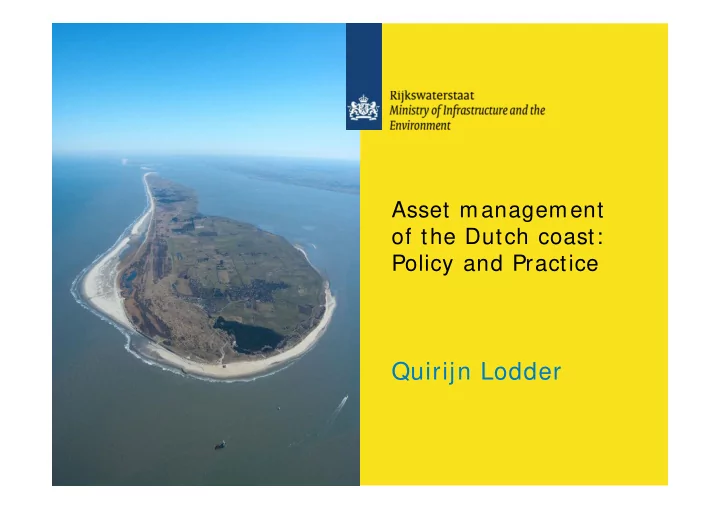

Asset management of the Dutch coast: Policy and Practice Quirijn Lodder
About myself: • Work: – Rijkswaterstaat (National Government) equivalent of Environment Agency • Tasks: – Technical Management of the Dutch Coastal Nourishment Program – Advise Flood Risk Management projects Rijkswaterstaat 2
Coastal Coastal Management Recession Policy Beach, dunes and Daily Compensate Gradual coastal functions circumstances structural erosion are preserved erosion Assessment of Flood Risk is at Extrem e Severe Flood Risk, acceptable stormsurges instantaneous reinforcements level erosion when necessary Rijkswaterstaat 3
Structural Erosion Beach 1945 Beach 1990 / present World War II bunkers Rijkswaterstaat 4
Coastal Erosion: Egmond aan Zee Rijkswaterstaat 5 5
Coastal Erosion: Egmond aan Zee Rijkswaterstaat 6 6
Vlieland 1 6 8 8 1 7 9 5 Rijkswaterstaat 7 De kust van Vlieland Oktober 2011 7
Compensation of structural erosion Beach, dunes and Daily Compensate Gradual coastal functions circumstances structural erosion are maintained erosion Assessment of Safety against Extrem e Severe safety, flooding is stormsurges instantaneous reinforcements secured erosion when necessary Rijkswaterstaat 8
Coastal evolution demand < supply surplus demand = supply balance demand > supply Measured Sea Level Rise Around 20 cm/ century deficit Rijkswaterstaat 9 9
Planning of Nourishments based on Reference Coastine (BKL in dutch) • Compensate erosion, preserve “sandy” system • Yearly: Measure, Asses, Plan Nourishm ents • Reference Coastline: – Preserve existing coastal functions (protection against flooding, structures on the dunes, dune habitat, recreation, fresh water extraction… .) Rijkswaterstaat 10
Preserve sufficient sediment in the active coastal zone Rijkswaterstaat 11
Why do we use sand? Rijkswaterstaat 12
3 level strategy 1. Do nothing 2. Buffer 3. Consolidate Rijkswaterstaat 13 13
Rijkswaterstaat 14
Rijkswaterstaat 15
Costs • Yearly budget, approx. 55Meuro/ 40 M GBP • Down from 70 Meuro in 2009 • Efficiency: 4 year plan vs annual plan Rijkswaterstaat 16
Tendering Type schip Contract 1: > 12 m draught Contract 2: < 6 m draught Contract 3: ca.7 m draught Goal maximize competition. Per contract a maximum price. Tenders above are not valid. Option charter a ship Rijkswaterstaat 17
Sequential tendering • Friday contract 1 • Tuesday notify all contractors who put in a bid • Friday contract 2 • Tuesday notify all contractors who put in a bid • Friday contract 3 • Tuesday notify all contractors who put in a bid • Finalize the contacts. Rijkswaterstaat 18
Ensuring tolerable flood risk Beach, dunes and Daily Gradual Compensate coastal functions circumstances erosion structural are preserved erosion Assessment of Safety against Extrem e Severe safety, flooding is stormsurges instantaneous reinforcements secured erosion when necessary Rijkswaterstaat 19
• Safety standards • A flood defence should be able to with stand the fixed standard Current standards • 1/ 10.000 central Holland • 1/ 4.000 rest of the coast • 1/ 2000 and 1/ 1250 inland rivers Rijkswaterstaat 20
Safety against flooding Erosion line Remaining Storm surge level strength Mean sea level Sedimentation 21 Figuren in huisstijl - Kant & klaar Rijkswaterstaat 21
Safety standards • All dutch levees have to meet a fixed “safety standard” • In other words: the accepted probability of breaching of a levee is set by the Water Act (the standards are given in next slide) • When insufficient Levee’s are reinforced Rijkswaterstaat 22
Example Noordwijk: Dike in Dune (2007-2008) Seaward dune extension of about 42 meter Water defense (dike and sand) is positioned seaward of boulevard (boulevard area becomes protected) Space for new developments on the boulevard (economic impulse) www.kustvisiezuidholland.nl Rijkswaterstaat 23
Rijkswaterstaat 24
Towards new safety standards • Current safety standards (embedded in Water Act) are derived from ‘expired’ risk- and cba analysis (late 1950’s) • Hence: current safety standards lead to suboptimal investments in flood risk reduction (now and in the future) • S ince 1990, ongoing work to gain insight to update the standards • 2014 first “draft” of new standards have been set • 2017 finalize within the legal framework Rijkswaterstaat 25
• Safety standards • A flood defence should be able to with stand the fixed standard Current standards • 1/ 10.000 central Holland • 1/ 4.000 rest of the coast • 1/ 2000 and 1/ 1250 inland rivers Rijkswaterstaat 26
potential flood risk vs “actual” flood risk Rijkswaterstaat 27
Policy objectives (2050) Letter to parliament (April 2013): 1. Provide a solidary baseline for personal safety Associated Risk metric: Local I ndividual Risk 1 0 -5 per year 2. Prevent large numbers of fatalities and large economic damage as much as possible Associated Risk metric: Societal risk / Econom ic risk ( CBA) 3. Prevent the loss or failure of vital / vulnerable national assets as much as possible Associated Risk metric: Econom ic risk ( CBA) Rijkswaterstaat 28
Level of standard: towards tolerability Local individual risk CBA 10 -4 ? -> CBA will overrule Optimizing economic risk 10 -5 ? -> tolerable? reduction vs costs 10 -6 ? -> too strict with € respect to floods as non Total cost man-made disaster investment Economic risk . ‘take the strictest’ Rijkswaterstaat 29
LIR 2020 Rijkswaterstaat 30
Economic risk 2020 Rijkswaterstaat 31
LIR 2020 LIR 2050 Rijkswaterstaat 32
Economic risk 2020 Economic risk 2050 Rijkswaterstaat 33
Rijkswaterstaat 34
Governance, key aspects • Water Act – Compensate structural erosion (Tool: reference coastline, helps with transparency and measure performance) – Safety levels for flood defences • Federal funding – Nourishments – Reinforcem ents flood defences (50% ) • Local funding – Maintenance of flood defences – Reinforcem ents flood defences (50% ) – Improvements to local infrastructure (f.i. beachfront) Rijkswaterstaat 35
Thank you for your attention Quirijn Lodder, Rijkswaterstaat Rijkswaterstaat 36
Recommend
More recommend